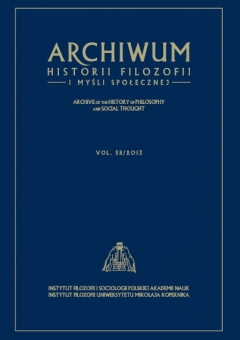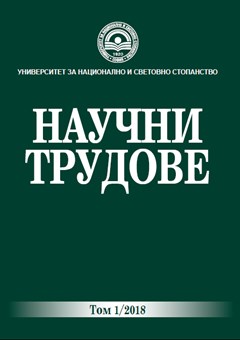Author(s): Antoni Szwed / Language(s): Polish
Issue: 58/2013
The article attempts to show that reconciliation of Kierkegaard’s and Hegel’s philosophy is impossible. The author of this article claims that there are no convincing philosophical interpretations which would allow to eliminate the essential difference between their philosophical understanding of human being. Analyses were carried out on example of so called subjective truth, given by Søren Kierkegaard in Concluding Unscientii c Postscriptum, where we find indirect polemics of Danish philosopher with Hegel. In the case of this latter philosopher subjective truth was concisely described as emerging from the long and complicated development of consciousness (Phenomenology of Spirit) and at the same time as a logical and ontological concept (Encyclopedia of Philosophical Sciences, Science of Logic), passing through from absolute indeterminacy to absolute definite unity, from nothingness to Absolute Spirit, from simplest forms to the most complicated ones. Both subject and object are submitted to this development. A whole development process occurs by necessary mediation of human, individual consciousness, where the main categories of Hegelian logical ontology are constituted. In fact, the realized absolute Idea (h e absolute Spirit) is the rational system itself, which can be interpreted as an ideal pattern of scientific knowledge. Two essential differences make up for the difference Kierkegaard’s existential dialectics compared with the Hegel’s one in regard to otherness. For Danish philosopher only momentary unity between subject and object can occur, in a moment of existential decision, undertaken by individual. Such a decision is an act of will, which has nothing to do with any kind of necessary process of mediation. Here we have no self-realization of Divine Absolute, because for existing man only different representations of God are attainable. In Kierkegaard’s dialectics they are connected with momentary positive relation, which is permanently overcome by a negative one. That is why subsequent objective approximations in the direction of truth are not possible. The Kierkegaardian existence is not confined to thinking alone, but is constituted be a synthesis of thinking and being, i.e. being as expressed in thinking. Kierkegaard points out falsity of Hegelian mediation on the level of religiousness A, strengthening his judgment (on absolute impossibility of Absolute mediation) on the basis of religiousness B, i. e. existential Christianity. Therefore any realization of Divine Absolute in human immanence is impossible. In particular, Danish philosopher rejected any possibility of simultaneous being of speculative thinker and of God’s believer. Contrarily to the System of Hegel, so called Kierkegaard’s system remains on the meta-objective level. Danish philosopher sketches only possible scenarios of human individual existences. Every human being may, if he/she wants, appropriate it in his/her way and use them. But these scenarios do not explain anything, and do not pretend to add anything to the ultimate knowledge regarding human nature.
More...


